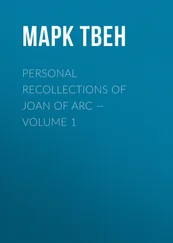Mark Twain - Personal Recollections of Joan of Arc — Volume 1
Здесь есть возможность читать онлайн «Mark Twain - Personal Recollections of Joan of Arc — Volume 1» весь текст электронной книги совершенно бесплатно (целиком полную версию без сокращений). В некоторых случаях можно слушать аудио, скачать через торрент в формате fb2 и присутствует краткое содержание. Год выпуска: 2004, Жанр: Историческая проза, на английском языке. Описание произведения, (предисловие) а так же отзывы посетителей доступны на портале библиотеки ЛибКат.
- Название:Personal Recollections of Joan of Arc — Volume 1
- Автор:
- Жанр:
- Год:2004
- ISBN:нет данных
- Рейтинг книги:5 / 5. Голосов: 1
-
Избранное:Добавить в избранное
- Отзывы:
-
Ваша оценка:
- 100
- 1
- 2
- 3
- 4
- 5
Personal Recollections of Joan of Arc — Volume 1: краткое содержание, описание и аннотация
Предлагаем к чтению аннотацию, описание, краткое содержание или предисловие (зависит от того, что написал сам автор книги «Personal Recollections of Joan of Arc — Volume 1»). Если вы не нашли необходимую информацию о книге — напишите в комментариях, мы постараемся отыскать её.
Personal Recollections of Joan of Arc — Volume 1 — читать онлайн бесплатно полную книгу (весь текст) целиком
Ниже представлен текст книги, разбитый по страницам. Система сохранения места последней прочитанной страницы, позволяет с удобством читать онлайн бесплатно книгу «Personal Recollections of Joan of Arc — Volume 1», без необходимости каждый раз заново искать на чём Вы остановились. Поставьте закладку, и сможете в любой момент перейти на страницу, на которой закончили чтение.
Интервал:
Закладка:
There was no crushing that spirit. You should have seen Cauchon. Defeated again, and he had not dreamed of such a thing. I heard it said the next day, around the town, that he had a full confession all written out, in his pocket and all ready for Joan to sign. I do not know that that was true, but it probably was, for her mark signed at the bottom of a confession would be the kind of evidence (for effect with the public) which Cauchon and his people were particularly value, you know.
No, there was no crushing that spirit, and no beclouding that clear mind. Consider the depth, the wisdom of that answer, coming from an ignorant girl. Why, there were not six men in the world who had ever reflected that words forced out of a person by horrible tortures were not necessarily words of verity and truth, yet this unlettered peasant-girl put her finger upon that flaw with an unerring instinct. I had always supposed that torture brought out the truth—everybody supposed it; and when Joan came out with those simple common-sense words they seemed to flood the place with light. It was like a lightning-flash at midnight which suddenly reveals a fair valley sprinkled over with silver streams and gleaming villages and farmsteads where was only an impenetrable world of darkness before. Manchon stole a sidewise look at me, and his face was full of surprise; and there was the like to be seen in other faces there. Consider—they were old, and deeply cultured, yet here was a village maid able to teach them something which they had not known before. I heard one of them mutter:
"Verily it is a wonderful creature. She has laid her hand upon an accepted truth that is as old as the world, and it has crumbled to dust and rubbish under her touch. Now whence got she that marvelous insight?"
The judges laid their heads together and began to talk now. It was plain, from chance words which one caught now and then, that Cauchon and Loyseleur were insisting upon the application of the torture, and that most of the others were urgently objecting.
Finally Cauchon broke out with a good deal of asperity in his voice and ordered Joan back to her dungeon. That was a happy surprise for me. I was not expecting that the Bishop would yield.
When Manchon came home that night he said he had found out why the torture was not applied.
There were two reasons. One was, a fear that Joan might die under the torture, which would not suit the English at all; the other was, that the torture would effect nothing if Joan was going to take back everything she said under its pains; and as to putting her mark to a confession, it was believed that not even the rack would ever make her do that.
So all Rouen laughed again, and kept it up for three days, saying:
"The sow has littered six times, and made six messes of it."
And the palace walls got a new decoration—a mitered hog carrying a discarded rack home on its shoulder, and Loyseleur weeping in its wake. Many rewards were offered for the capture of these painters, but nobody applied. Even the English guard feigned blindness and would not see the artists at work.
The Bishop's anger was very high now. He could not reconcile himself to the idea of giving up the torture. It was the pleasantest idea he had invented yet, and he would not cast it by. So he called in some of his satellites on the twelfth, and urged the torture again. But it was a failure.
With some, Joan's speech had wrought an effect; others feared she might die under torture; others did not believe that any amount of suffering could make her put her mark to a lying confession. There were fourteen men present, including the Bishop. Eleven of them voted dead against the torture, and stood their ground in spite of Cauchon's abuse. Two voted with the Bishop and insisted upon the torture. These two were Loyseleur and the orator—the man whom Joan had bidden to "read his book"—Thomas de Courcelles, the renowned pleader and master of eloquence.
Age has taught me charity of speech; but it fails me when I think of those three names—Cauchon, Courcelles, Loyseleur.
Chapter 17
Supreme in Direst Peril
ANOTHER ten days' wait. The great theologians of that treasury of all valuable knowledge and all wisdom, the University of Paris, were still weighing and considering and discussing the Twelve Lies.
I had had but little to do these ten days, so I spent them mainly in walks about the town with Noel. But there was no pleasure in them, our spirits being so burdened with cares, and the outlook for Joan growing steadily darker and darker all the time. And then we naturally contrasted our circumstances with hers: this freedom and sunshine, with her darkness and chains; our comradeship, with her lonely estate; our alleviations of one sort and another, with her destitution in all. She was used to liberty, but now she had none; she was an out-of-door creature by nature and habit, but now she was shut up day and night in a steel cage like an animal; she was used to the light, but now she was always in a gloom where all objects about her were dim and spectral; she was used to the thousand various sounds which are the cheer and music of a busy life, but now she heard only the monotonous footfall of the sentry pacing his watch; she had been fond of talking with her mates, but now there was no one to talk to; she had had an easy laugh, but it was gone dumb now; she had been born for comradeship, and blithe and busy work, and all manner of joyous activities, but here were only dreariness, and leaden hours, and weary inaction, and brooding stillness, and thoughts that travel by day and night and night and day round and round in the same circle, and wear the brain and break the heart with weariness. It was death in life; yes, death in life, that is what it must have been. And there was another hard thing about it all. A young girl in trouble needs the soothing solace and support and sympathy of persons of her own sex, and the delicate offices and gentle ministries which only these can furnish; yet in all these months of gloomy captivity in her dungeon Joan never saw the face of a girl or a woman. Think how her heart would have leaped to see such a face.
Consider. If you would realize how great Joan of Arc was, remember that it was out of such a place and such circumstances that she came week after week and month after month and confronted the master intellects of France single-handed, and baffled their cunningest schemes, defeated their ablest plans, detected and avoided their secretest traps and pitfalls, broke their lines, repelled their assaults, and camped on the field after every engagement; steadfast always, true to her faith and her ideals; defying torture, defying the stake, and answering threats of eternal death and the pains of hell with a simple "Let come what may, here I take my stand and will abide."
Yes, if you would realize how great was the soul, how profound the wisdom, and how luminous the intellect of Joan of Arc, you must study her there, where she fought out that long fight all alone—and not merely against the subtlest brains and deepest learning of France, but against the ignoble deceits, the meanest treacheries, and the hardest hearts to be found in any land, pagan or Christian.
She was great in battle—we all know that; great in foresight; great in loyalty and patriotism; great in persuading discontented chiefs and reconciling conflicting interests and passions; great in the ability to discover merit and genius wherever it lay hidden; great in picturesque and eloquent speech; supremely great in the gift of firing the hearts of hopeless men and noble enthusiasms, the gift of turning hares into heroes, slaves and skulkers into battalions that march to death with songs on their lips. But all these are exalting activities; they keep hand and heart and brain keyed up to their work; there is the joy of achievement, the inspiration of stir and movement, the applause which hails success; the soul is overflowing with life and energy, the faculties are at white heat; weariness, despondency, inertia—these do not exist.
Читать дальшеИнтервал:
Закладка:
Похожие книги на «Personal Recollections of Joan of Arc — Volume 1»
Представляем Вашему вниманию похожие книги на «Personal Recollections of Joan of Arc — Volume 1» списком для выбора. Мы отобрали схожую по названию и смыслу литературу в надежде предоставить читателям больше вариантов отыскать новые, интересные, ещё непрочитанные произведения.
Обсуждение, отзывы о книге «Personal Recollections of Joan of Arc — Volume 1» и просто собственные мнения читателей. Оставьте ваши комментарии, напишите, что Вы думаете о произведении, его смысле или главных героях. Укажите что конкретно понравилось, а что нет, и почему Вы так считаете.












